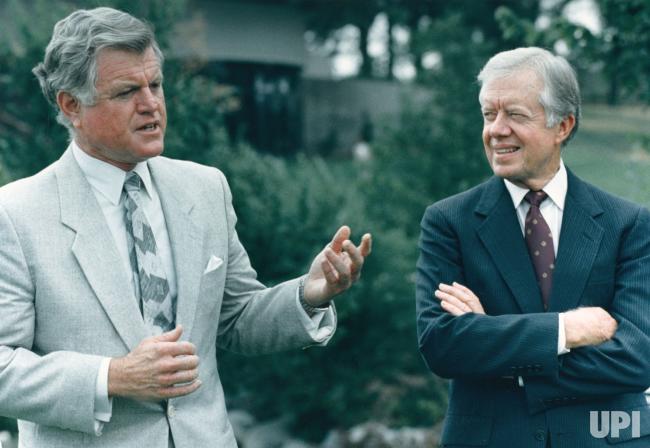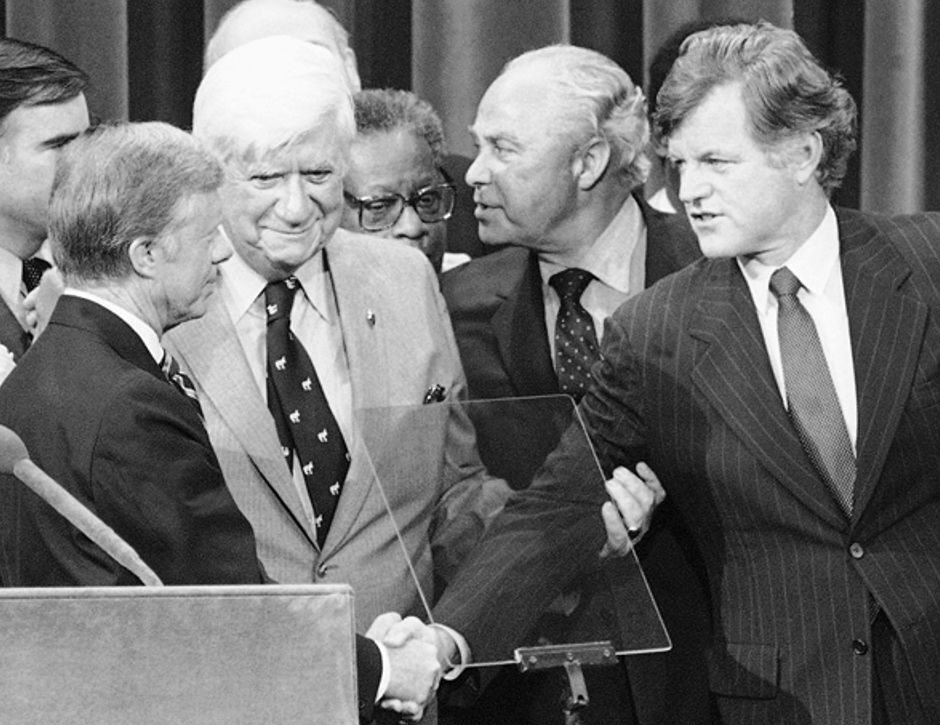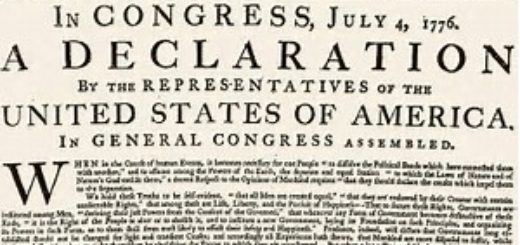The 1980 Democratic Convention: Kennedy vs. Carter
The 1980 convention will be forever remembered for Ted Kennedy’s captivating speech affirming party principles.
At the 2024 Democratic National Convention last week in Chicago, delegates united around the ticket of Vice President Kamala Harris and Minnesota Gov. Tim Walz. Optimism and good cheer abounded. Of course, it wasn’t always that easy…
Insurgent Candidates
The last contested Democratic Convention was in 2016 when Bernie Sanders and Hillary Clinton battled it out. Sanders’ reluctant endorsement of Clinton offers a striking parallel to the Democratic Convention of 1980. That year, an insurgent not unlike Bernie Sanders, Ted Kennedy, made a vigorous but doomed effort to release delegates from their primary pledges.
The 1980 Democratic convention in New York City will be forever remembered for Ted Kennedy’s electrifying concession speech. You can read the entire speech here. An excerpt clip from YouTube can be found towards the end of this article.
Kennedy Goes All In
By the fall of 1979, certain political markers were gathering steam. One pollster warned that incumbent President Jimmy Carter was running five points or so behind the presumptive Republican nominee Ronald Reagan. A labor-backed “Draft Teddy” movement was being organized for the Iowa Caucuses. A Boston Globe poll showed Carter trailing Kennedy in a hypothetical match-up by 22 points.
The Kennedy camp’s response to the insurgents was “cool it.” Ted Kennedy liked to think of himself as a loyal, party-line Democrat. But there was a major crack in the foundation that was Democratic Party unity. The progressive wing of the party was flexing its muscles over an issue near and dear to Ted Kennedy’s heart: health care.
Kennedy wanted a “health care for all” program with a price tag of at least $28.6 billion. President Carter’s proposal seemed limp in comparison. “The exercise,” remarked one Kennedy staffer, “is moving the president, not kicking him in the behind.”
Differences became irreconcilable and the fight was on.

Caroline Kennedy and Ted Kennedy support Barack Obama at the Democratic Convention in Denver, CO, in 2008, a year before Ted’s death. Montage image from Alamy
Nostalgia for Camelot
After a frustrating primary season in which President Carter remained above the fray (his “Rose Garden strategy”), Ted Kennedy arrived at Madison Square Garden trailing Carter by 700 delegates. Ted had even lost the New Hampshire primary, 48-38, a state in his own backyard.
Kennedy dispatched top aide Harold M. Ickes (future deputy chief of staff to Bill Clinton) and brother-in-law Stephen Smith to wrangle for delegates and create roadblocks for Carter on the convention floor. “It was a brutal political fistfight,” remembered Ickes. “Many people saw this as the last of the brothers carrying the family torch.”
 Ted Kennedy of course came up short and tasted the bitter disappointment that transcended a mere election loss. Ickes: “The senator had the additional burden of carrying the family legacy. It was a bitter loss for everyone, but it is a great testament to him that he put that behind him and went on to forge a stellar career in the Senate.”
The Speech
The author of the speech, Bob Shrum, wrote this in Time magazine:
There is in that 1980 speech an insight into the long arc of his achievement: his belief in something bigger than himself, his persistence despite the odds, his capacity to express the conscience of the party and his party’s best possibilities.
John Podesta, future chief of staff to President Obama, exclaimed: “I was lucky enough to be on the podium with him. It was the most electric moment of my life before or since. It felt like fireworks after every word.”
This clip is published by the JFK Library via YouTube:
Coda
President Jimmy Carter lost big to Ronald Reagan in the 1980 presidential election. In my view, Kennedy’s insurgency wasn’t much of a factor. An inflationary economy and the Iran hostage crisis sealed Carter’s fate.
Was the chasm between Sanders’ and Clinton’s supporters decisive in Clinton’s 2016 razor-thin loss to Republican Donald Trump? I’m not aware of any consensus on that point. Hillary’s commanding lead evaporated amid the Comey letter and a vicious whispering campaign over “missing emails” and alleged corruption.
Party unity is perhaps overrated.
Could Bernie Sanders have beaten Trump? Could Ted Kennedy have beaten Ronald Reagan? Food for thought.


















































































































